by Brian Hioe
語言:
English
Photo Credit: Ko Wen-je/Facebook
DEMONSTRATORS PROTESTED on Ketagalan Boulevard today for a rally called by former NPP chair Huang Kuo-Chang and influential streamer and bodybuilder Holger Chen. The rally drew tens of thousands, despite intense heat in the afternoon, and can be seen as the first major campaign rally of the 2024 election season. The rally began at 2 PM.
The rally was ostensibly focused on the issue of housing justice and judicial reform. Nevertheless, the rally crystallized around the demands at a late stage, and can more appropriately be viewed as a rally by the political alignment of Huang and Chen that emerged in the last presidential election cycle which previously demonstrated against the influence of “Red Media”. Although Huang was the leader of the NPP after its emergence from the Sunflower Movement and his own political career dates to being a major leader of the Sunflower Movement, now he is seen as increasingly close to Ko Wen-je’s TPP.
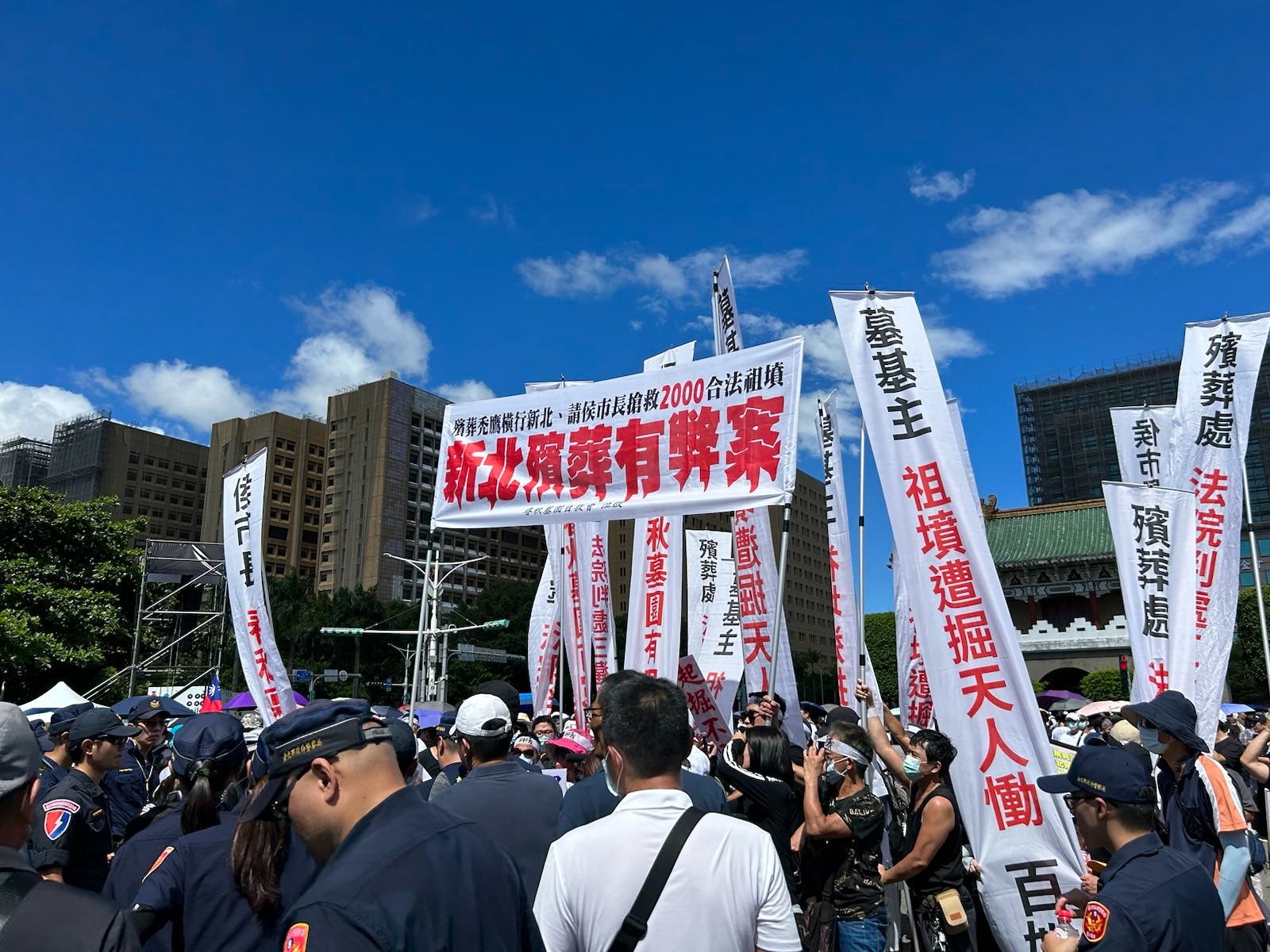 Photo credit: Brian Hioe
Photo credit: Brian Hioe
As such, the rally today featured pan-Blue presidential candidates including Ko and Hou You-yi of the KMT, as well as Foxconn founder Terry Gou, though the NPP legislative caucus also made an appearance and the rally framed itself as non-partisan. It proves unusual that nine years after the Sunflower Movement, at a time in which many other major Sunflower Movement figures joined the DPP as candidates, a former Sunflower Movement leader would make an appearance on the same stage as pan-Blue candidates pushing for passing the CSSTA that the movement was originally in opposition to such as Ko, Hou, and Gou–all the more so when in 2019, Huang was still demonstrating against “red media.” As Ko himself was originally a political figure backed by activists in the wake of the Sunflower Movement before reorienting to the pan-Blue camp, Huang himself may be viewed in a similar light.
Despite the KMT’s struggles securing support from young people in past years, with less than 9,000 members under 40 in 2020, the rally today was mostly young people. This is in line with the view that Ko’s supporters are mostly young people, unlike other pan-Blue candidates. The crowd, however, slanted heavily male, which may be in line with Chen’s fanbase. In this sense, the rally served to rally pan-Blue young people. Various pan-Blue groups including Tsai dissertation deniers, the New Party, and others were present.
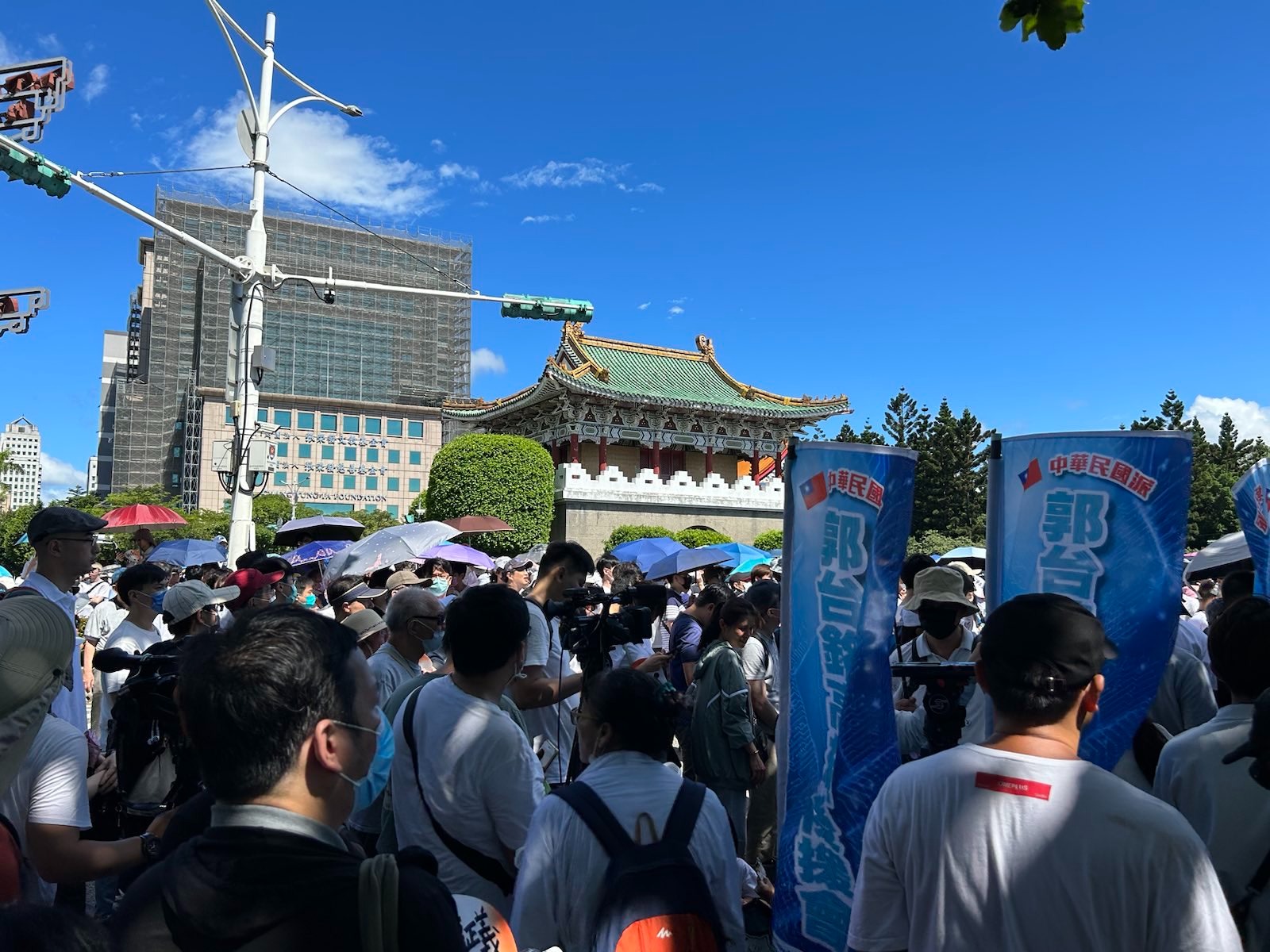 Photo credit: Brian Hioe
Photo credit: Brian Hioe
The first hour of the rally focused on speakers framed as from civil society groups. A recurring theme of the speakers was attacking the DPP for failing to address issues of socioeconomic equality regarding housing. This was on a number of fronts, including the DPP’s slow progress in constructing social housing, as well as that housing continued to be unaffordable for young people. Measures by the DPP to push for transparency in housing prices and avoid the hoarding of real estate by property owners were criticized as last-minute efforts.
Otherwise, speakers criticized the DPP for failing to address widespread issues related to fraud in Taiwan. The DPP was accused of itself being tied to vested interests, including links to corrupt real estate developers and organized crime. With regards to judicial reform, the DPP was framed as interfering in the independence of the judiciary, with alleged interference by Minister of Justice Chiu Tai-san and Legislative Yuan vice president Tsai Chi-chang.
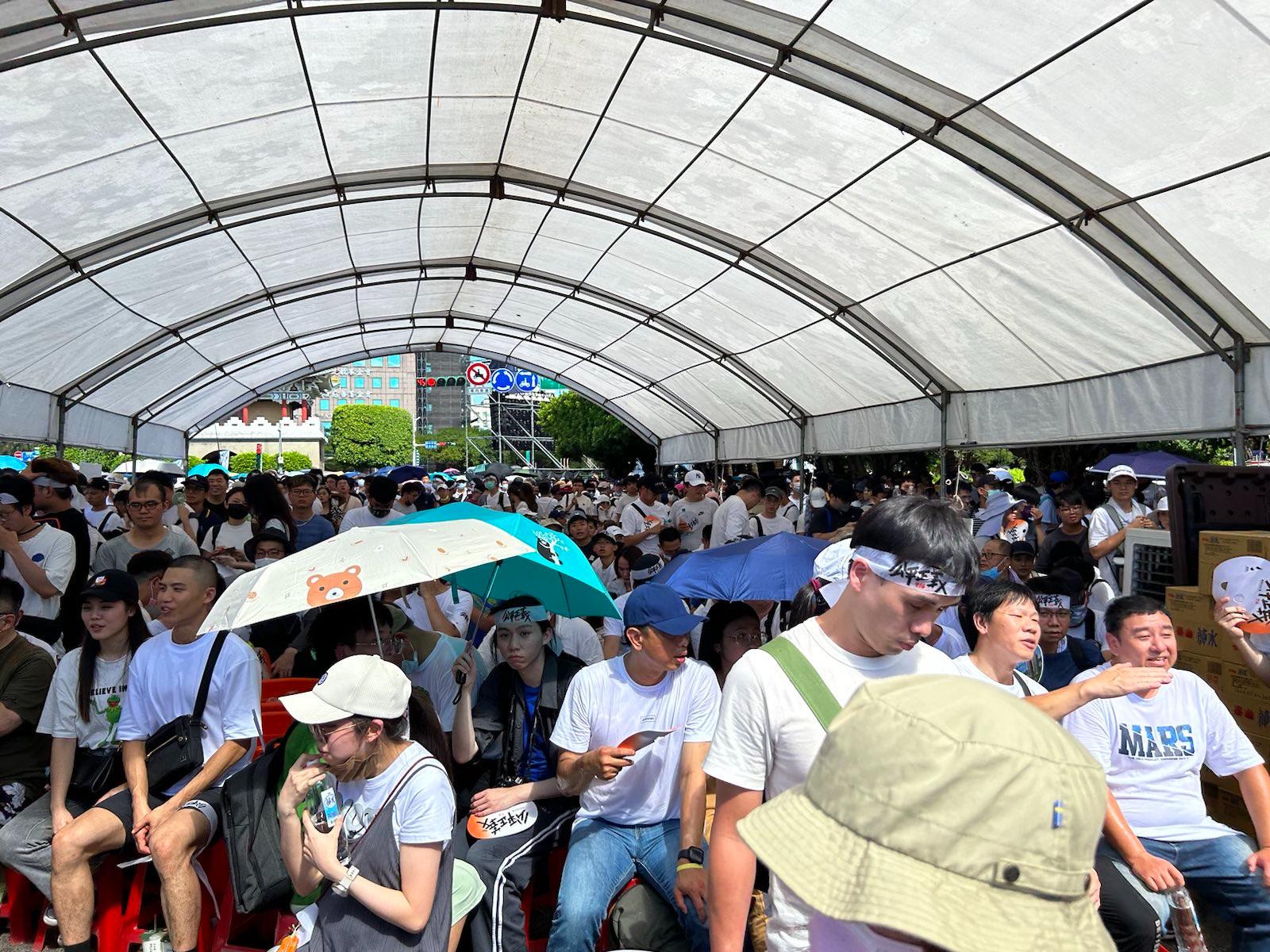 Photo credit: Brian Hioe
Photo credit: Brian Hioe
The second and third hours of the event, however, involved speakers that were politicians. Representatives of all opposition parties were present, though no DPP politicians were. As today is the same day as the DPP’s party congress, the DPP was criticized as being off enjoying air conditioning while the participants in the demonstration endured the heat.
The first speaker who was a major politician was Terry Gou. Gou, otherwise an unusual presence at a rally about housing justice as one of Taiwan’s richest men, generally reiterated criticisms of the DPP and praised Huang and Chen for organizing the rally. Gou did not surprise with any of his comments, even as speculation continues about a prospective political alignment between himself and Ko in the presidential race next year.
Subsequently, the TPP legislative caucus spoke, touting Ko’s record as Taipei mayor on issues regarding housing justice and attacking the Tsai administration’s record.
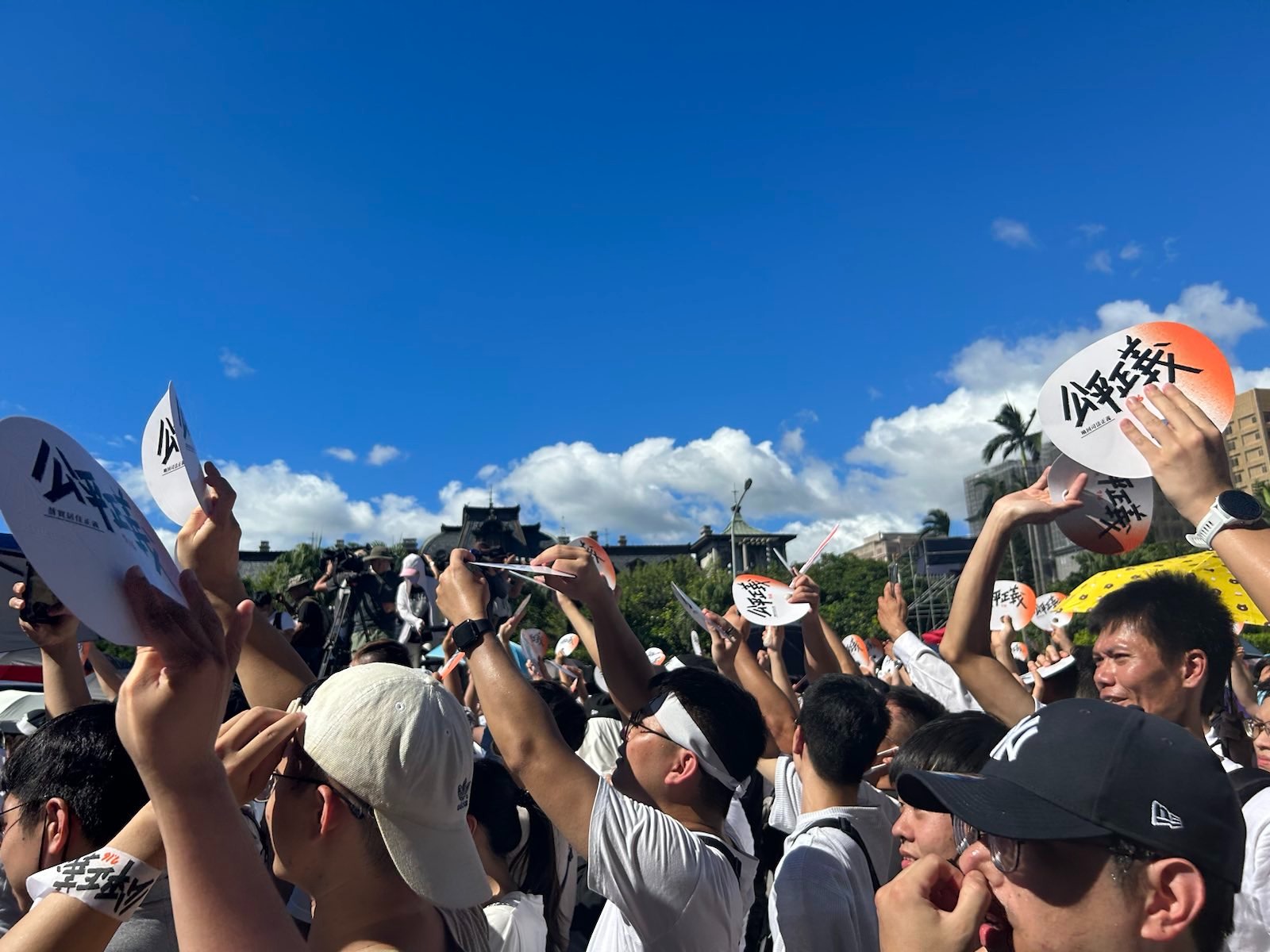 Photo credit: Brian Hioe
Photo credit: Brian Hioe
Next, Hou You-yi took to the stage. Hou sought to lean into his ability to speak Taiwanese Hokkien fluently, suggesting questions about the Tsai administration’s purchases of COVID-19 vaccines, and tout his links with the police as a former police chief to attack the Tsai administration for inaction against crime. However, Hou was jeered by young people at the rally, with shouts including “Han Kuo-yu was funnier! Give us back Han!”—by contrast, Gou was cheered by the crowd. This goes to show to what extent the KMT is unable to appeal to even pan-Blue young people, and how Ko Wen-je’s humorous political persona seems to have found resonance among young people. After this incident, Hou reportedly left early.
After Hou, the NPP spoke. Party chair Claire Wang criticized the DPP for its inaction over issues regarding housing justice but also criticized the KMT. Wang’s comments went on to criticize the notion of aligning with pan-Blue politicians such as Hou, Gou, or Ko, critiquing Ko’s record as Taipei mayor, and suggesting that aligning with the pan-Blue camp was not befitting of the “Third Force”. Wang was booed by the rally for these comments. Subsequent comments by Chen Jiau-hua criticizing the DPP for attacking her over her property investments were better received, seeing as it was a recurring theme for speakers at the rally to criticize the DPP for maligning them.
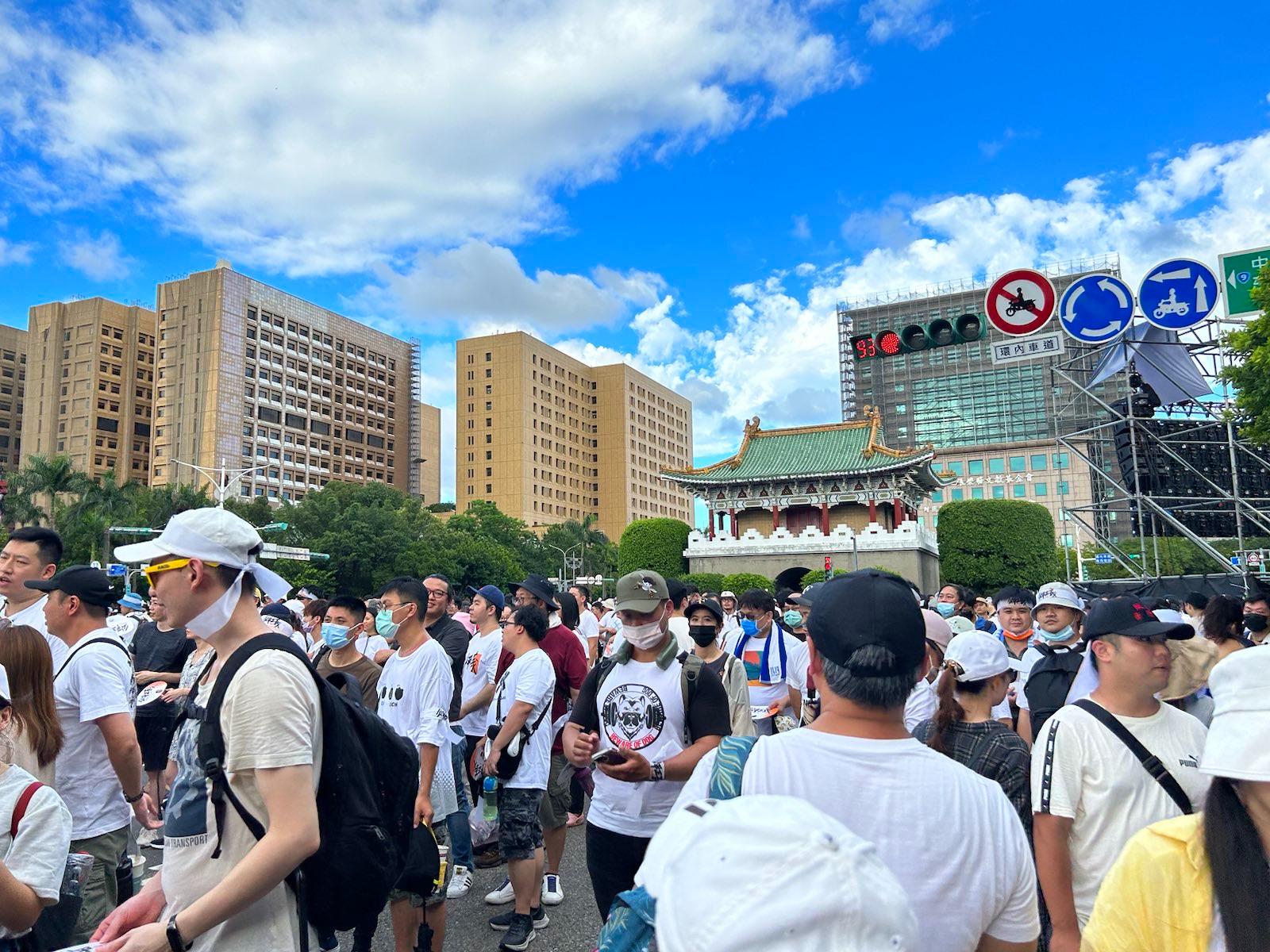 Photo credit: Brian Hioe
Photo credit: Brian Hioe
The last political speaker was Ko Wen-je, who took to the stage to the largest cheers. Ko attacked the DPP for moving too slowly on the issue of social housing and failing to stop widespread issues of fraud, stating that the government was the largest fraud group in society. Ko stated that he would target “black box” measures, provide subsidies for renters, and push for transparency, stating that as it was now, the government was too tied to construction groups, and easily influenced by corruption in that way. Ko claimed not to know much about judicial reform but stated that he would listen to Huang’s views on the matter, as an expert–it is speculated that Huang may be angling for a position as head of the Judicial Yuan in a prospective Ko administration though Ko has remained coy on the idea. After Ko, comments by Holger Chen closed the rally.
It proved unusual that many of the speakers cited the Sunflower Movement in a positive light, given Huang’s past as a leader of the movement, when many of those present were pan-Blue antagonists to the movement. Nevertheless, this perhaps goes to show that some young people who participated or were supportive of the movement in fact still could support the pan-Blue camp some nine years later.
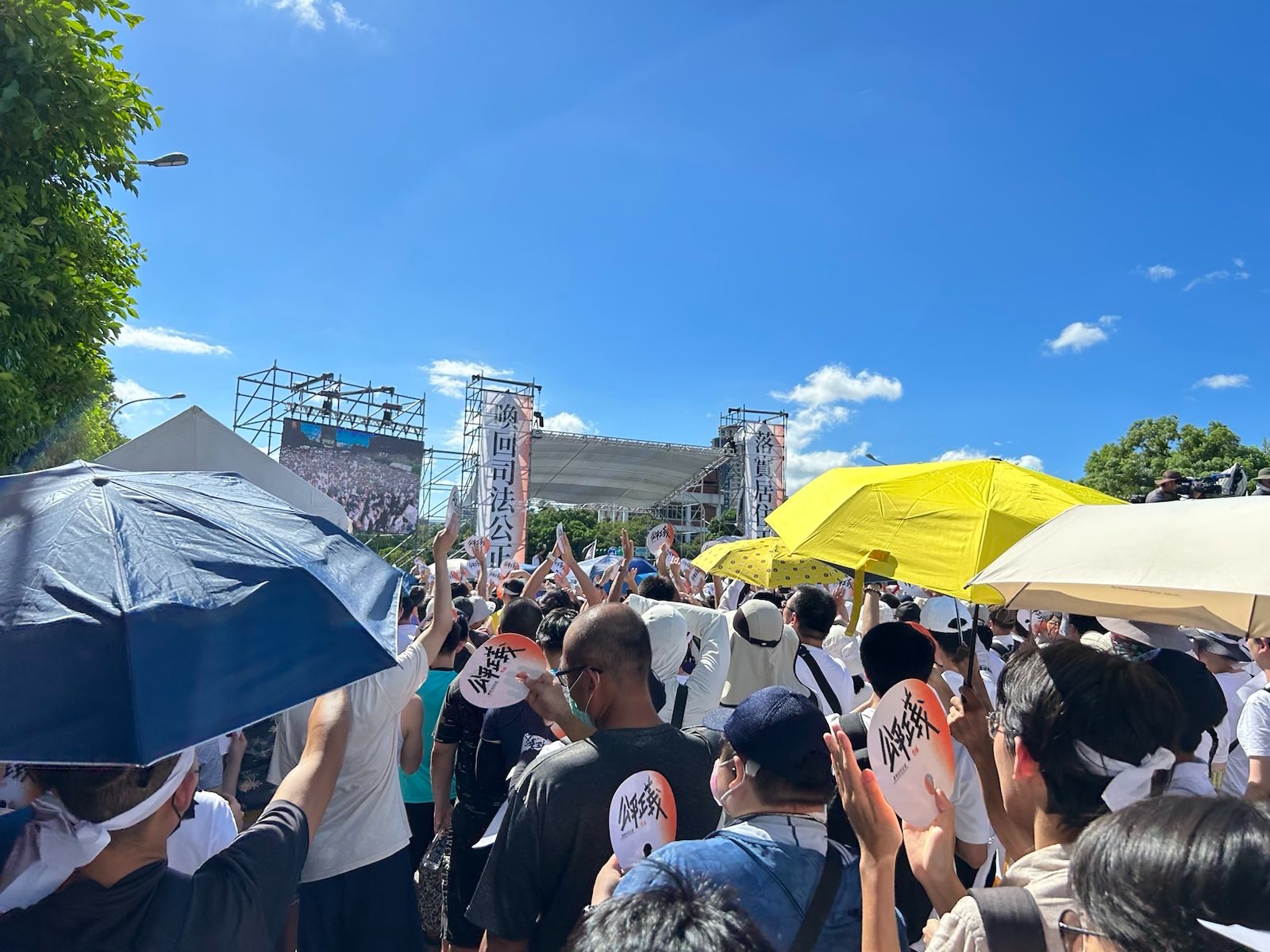 Photo credit: Brian Hioe
Photo credit: Brian Hioe
But while most of the issues brought up were with regards to the failings of the DPP’s domestic politics, there was little discussion of cross-strait issues–historically, the largest factor influencing presidential elections. Pan-blue candidates would likely find it prudent to avoid discussion of cross-strait issues at a rally that was mostly young people. The rally might highlight housing justice and judicial reform as domestic issues that the DPP will be attacked on in the election, but it is doubtful that cross-strait will fall out of the equation, and could still remain the major determining factor on election outcomes. Yet the rally goes to demonstrate that while there are pan-Blue young people, the KMT has largely failed to attract them, and their support has instead gone to Gou and Ko.

